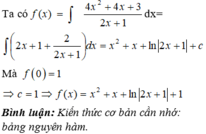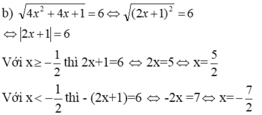Tìm x biết : 4x2-4x-1=0
Hãy nhập câu hỏi của bạn vào đây, nếu là tài khoản VIP, bạn sẽ được ưu tiên trả lời.


b)x2-2x+1=4
⇔(x-1)2=4
\(\Leftrightarrow\left[{}\begin{matrix}x-1=2\\x-1=-2\end{matrix}\right.\Leftrightarrow\left[{}\begin{matrix}x=3\\x=-1\end{matrix}\right.\)
c)x2-4x+4=9
⇔ (x-2)2=9
\(\Leftrightarrow\left[{}\begin{matrix}x-2=3\\x-2=-3\end{matrix}\right.\Leftrightarrow\left[{}\begin{matrix}x=5\\x=-1\end{matrix}\right.\)
d)4x2-4x+1=4
⇔ (2x-1)2=4
\(\Leftrightarrow\left[{}\begin{matrix}2x-1=4\\2x-1=-4\end{matrix}\right.\Leftrightarrow\left[{}\begin{matrix}x=\dfrac{5}{2}\\x=\dfrac{-3}{2}\end{matrix}\right.\)
e)x2-2x-8=0
⇔ x2-4x+2x-8=0
⇔ x(x-4)+2(x-4)=0
⇔(x-4)(x+2)=0
\(\Leftrightarrow\left[{}\begin{matrix}x=4\\x=-2\end{matrix}\right.\)
f)9x2-6x-8=0
⇔ 9x2-12x+6x-8=0
⇔ 3x(3x-4)+2(3x-4)=0
⇔ (3x-4)(3x+2)=0
\(\Leftrightarrow\left[{}\begin{matrix}x=\dfrac{4}{3}\\x=\dfrac{-2}{3}\end{matrix}\right.\)

a)
`4(x-2)^2 =4`
`<=>(x-2)^2 =1`
`<=>x-2=1` hoặc `x-2=-1`
`<=>x=3` hoặc `x=1`
b)
`5(x^2 -6x+9)=5`
`<=>(x-3)^2 =1`
`<=>x-3=1`hoặc `x-3=-1`
`<=>x=4` hoặc `x=2`
c)
`4x^2 +4x+1=0`
`<=>(2x+1)^2 =0`
`<=>2x+1=0`
`<=>x=-1/2`
d)
`9x^2 +6x+1=2`
`<=>(3x+1)^2 =2`
\(< =>\left[{}\begin{matrix}3x+1=\sqrt{2}\\3x+1=-\sqrt{2}\end{matrix}\right.\\ < =>\left[{}\begin{matrix}x=\dfrac{\sqrt{2}-1}{3}\\x=\dfrac{-\sqrt{2}-1}{3}\end{matrix}\right.\)

a) ⇔ \(4x^2+4x-x-1=0\)
⇔ \(4x^2+3x-1=0\)
⇔ \(4x(x+1)-(x+1)=0\)
⇔ \((x+1)(4x-1)=0\)
⇒ \(\left[{}\begin{matrix}x=-1\\x=\dfrac{1}{4}\end{matrix}\right.\)
Vậy...
b) \(x^3-4x^2+4x=0\)
⇔ \(x^2(x-2)-2x(x-2)=0\)
⇔ \((x-2)(x^2-2x)=0\)
⇒ \(\left[{}\begin{matrix}x=2\\x=0\end{matrix}\right.\)
Vậy...
c) \(x^2-3x+2=0\)
⇔ \(x(x-2)-(x-2)=0\)
⇔ \((x-1)(x-2)=0\)
⇒ \(\left[{}\begin{matrix}x=1\\x=2\end{matrix}\right.\)
Vậy...

\(x^6+2x^3+1=0\)
\(\Leftrightarrow\left(x^3\right)^2+2x^3+1=0\)
\(\Leftrightarrow\left(x^3+1\right)^2=0\)
\(\Leftrightarrow x^3=\left(-1\right)^3\)
\(\Leftrightarrow x=-1\)
___________
\(x\left(x-5\right)=4x-20\)
\(\Leftrightarrow x\left(x-5\right)-4\left(x-5\right)=0\)
\(\Leftrightarrow\left(x-5\right)\left(x-4\right)=0\)
\(\Leftrightarrow\left[{}\begin{matrix}x=4\\x=5\end{matrix}\right.\)
_____________
\(x^4-2x^2=8-4x^2\)
\(\Leftrightarrow x^2\left(x^2-2\right)+\left(4x^2-8\right)=0\)
\(\Leftrightarrow x^2\left(x^2-2\right)+4\left(x^2-2\right)=0\)
\(\Leftrightarrow\left(x^2-2\right)\left(x^2+4\right)=0\)
\(\Leftrightarrow x^2=2\)
\(\Leftrightarrow x=\pm\sqrt{2}\)
_______________
\(\left(x^3-x^2\right)-4x^2+8x-4\)
\(\Leftrightarrow x^2\left(x-1\right)-4\left(x^2-2x+1\right)=0\)
\(\Leftrightarrow x^2\left(x-1\right)-4\left(x-1\right)^2=0\)
\(\Leftrightarrow\left(x-1\right)\left(x^2-4x+4\right)=0\)
\(\Leftrightarrow\left(x-1\right)\left(x-2\right)^2=0\)
\(\Leftrightarrow\left[{}\begin{matrix}x=1\\x=2\end{matrix}\right.\)

\(a,\Leftrightarrow x\left(2x-7\right)+2\left(2x-7\right)=0\\ \Leftrightarrow\left(x+2\right)\left(2x-7\right)=0\Leftrightarrow\left[{}\begin{matrix}x=-2\\x=\dfrac{7}{2}\end{matrix}\right.\\ b,\Leftrightarrow x\left(x^2-9\right)=0\\ \Leftrightarrow x\left(x-3\right)\left(x+3\right)=0\Leftrightarrow\left[{}\begin{matrix}x=0\\x=3\\x=-3\end{matrix}\right.\\ c,\Leftrightarrow\left(2x-1\right)\left(2x+1\right)-2\left(2x-1\right)^2=0\\ \Leftrightarrow\left(2x-1\right)\left(2x+1-4x+2\right)=0\\ \Leftrightarrow\left(2x-1\right)\left(-2x+3\right)=0\Leftrightarrow\left[{}\begin{matrix}x=\dfrac{1}{2}\\x=\dfrac{3}{2}\end{matrix}\right.\\ d,\Leftrightarrow x^2\left(x-1\right)-4\left(x-1\right)^2=0\\ \Leftrightarrow\left(x-1\right)\left(x^2-4x+4\right)=0\\ \Leftrightarrow\left(x-1\right)\left(x-2\right)^2=0\Leftrightarrow\left[{}\begin{matrix}x=1\\x=2\end{matrix}\right.\)

Ta có: 1 - 4 x + 4 x 2 = 5 ⇔ 1 - 2 x 2 = 5
⇔ |1 - 2x| = 5 (3)
* Trường hơp 1: 1 - 2x ≥ 0 ⇔ 2x ≤ 1 ⇔ x ≤ 1/2 ⇒ |1 - 2x| = 1 - 2x
Suy ra: 1 - 2x = 5 ⇔ -2x = 5 - 1 ⇔ x = -2
Giá trị x = -2 thỏa mãn điều kiện x ≤ 1/2
Vậy x = -2 là nghiệm của phương trình (3).
* Trường hợp 2: 1 - 2x < 0 ⇔ 2x > 1 ⇔ x > 12 ⇒ |1 - 2x| = 2x - 1
Suy ra: 2x - 1 = 5 ⇔ 2x = 5 + 1 ⇔ x = 3
Giá trị x = 3 thỏa mãn điều kiện x > 1/2
Vậy x = 3 là nghiệm của phương trình (3).
Vậy x = -2 và x = 3.

4 x 2 - 4 x + 1 = 3
⇔ 2 x - 1 2 = 3 ⇔ 2 x - 1 = 3
⇔ [ 2 x - 1 = 3 2 x - 1 = - 3
Nên x = 2 hoặc x = -1
Vậy phương trình có nghiệm x = 2; x = - 1


\(\left(2x-1\right)^2=0\)
\(2x-1=0\Leftrightarrow x=\dfrac{1}{2}\)
x ∈ N*